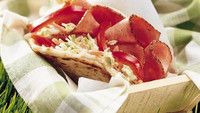For many, quality delicatessen meals are strictly a take-out treat, complete with long lines. However, sometimes the best deli food is as close as a take-out from your kitchen to your dining room.
"Sometimes, people get so used to eating a type of food in a restaurant that they would never think to make it at home," said Judy Zeidler, author of the classic cookbook, "Judy Zeidler's International Deli Cookbook." "But in the case of deli food, many recipes pack tremendous flavor, but are really easy to prepare. Others are just the kind that adventurous cooks look for — new culinary mountains to climb that offer dynamic results."
For example, perhaps you've never made your own pastrami at home. If you've only had juicy, thick pastrami sandwiches in restaurants, maybe you didn't even realize the whole delicious thing usually starts with brisket. However, if you've got a brisket, some kosher salt, saltpeter, ginger, peppercorns, a smoker — and about three weeks to let the brisket cure in your refrigerator — you can end up with deli-style pastrami at home, like "Judy Zeidler's International Deli Cookbook" recipe that follows.
"While some of the techniques for the meats take time, the recipes are still very easy to prepare," said Zeidler, who was one of the longtime family owners of the Broadway Deli on the famed Third Street Promenade in Santa Monica.
On the other hand, it's surprising how quickly deli staples, such as knishes, cole slaw, potato salad and innovative sandwiches, can be whipped up at home.
Recipes like these are, of course, anything but new. Hailing from Eastern European and Central European countries, Jewish-style deli food has been around for centuries. So have the bounties from conditorie (Scandinavian delis), salumeria (Italian), charcuteries (French) and delikatessens (German).
Zeidler included international offerings in her now-classic deli cookbook, but, due to its popularity, chronicled at length Jewish deli fare, like the recipes that follow.
QUICK HERRING SALAD
1 (16-ounce) jar pickled herring fillets in sour cream
1/2 cup sour cream
1 small red onion, thinly sliced
1 tart apple, such as pippin or Granny Smith, peeled, cored and chopped
6 to 8 Boston or Bibb lettuce leaves
Dash of paprika, for garnish
2 tablespoons minced fresh dill, for garnish
Thinly sliced rye bread, to taste, for serving
Yields 6 to 8 servings.
Cut herring fillets into bite-size strips and place, along with half of its sour cream, in a large glass bowl. Gently fold in the additional 1/2 cup sour cream. Fold in onion and apple. Cover with plastic wrap and chill before serving.
To serve: Arrange lettuce leaves on chilled salad plates; spoon herring mixture on top and sprinkle with paprika and dill. Serve with thin slices of rye bread.
DELI-STYLE PASTRAMI
1 cup coarse kosher salt
1/4 cup sugar
2 teaspoons (culinary-use) saltpeter (see Note)
1/4 cup ground ginger
1/4 cup crushed black peppercorns
2 to 3 cloves garlic, crushed
1 beef brisket (about 5 pounds), trimmed of fat
Yields 12 servings.
In a bowl, combine salt, sugar, saltpeter or baking soda, ginger, peppercorns and garlic. Rub brisket well with the salt mixture and place it in a glass dish or an enameled pan. Cover with plastic wrap and aluminum foil and weight it down with a board covered with bricks or heavy cans of food. Store in the refrigerator for 3 weeks.
At the end of that time, dry beef with paper towels. Then smoke for 3 hours at 150 F to 170 F, according to smoker directions.
In a large heavy pot, place smoked brisket, cover with water, bring to a boil, cover, reduce heat, and simmer until tender when pierced with a fork, 3 to 4 hours. Cool in the pot; cover with plastic wrap and aluminum foil and chill. This will keep for a week stored in the refrigerator. Slice as needed for sandwiches.
Note: Saltpeter (potassium nitrate) gives the characteristic red color to many cured meats and also acts as a preservative. (Use one packaged for culinary use.) It is sold in most drugstores (and some gourmet stores and online). If you are concerned about consuming nitrates, bicarbonate of soda (commonly called baking soda) may be substituted, but it is not quite as effective in the preparation of such recipes.
Photo courtesy of BettyCrocker.com
AFTER-WORK GOURMET COOKBOOK SHELF
If you think every smoothie qualifies as a "zero belly" treat, bestselling nutrition writer David Zinczenko thinks you need not only some of the refreshing beverages, but a refresher course as well. That could come in the form of his "Zero Belly Smoothies: Lose Up to 16 Pounds in 14 Days and Sip Your Way to a Lean & Healthy You." Zinczenko, author of many popular books, including the "Eat This, Not That" series, promises mixes of nutrients to flatten one's stomach, boost metabolism, permanently tame fat genes and soothe the digestive system. Smoothies include proteins, fruits and vegetables, grains and healthy fats, and are based on his bestselling "Zero Belly Diet." Along the way, Zinczenko "busts" some popular chain-store "health" smoothies for being high in sugar grams and calories and missing some of the elements he declares are essential.
Lisa Messinger is a first-place winner in food writing from the Association of Food Journalists and the author of seven food books, including "Mrs. Cubbison's Best Stuffing Cookbook" and "The Sourdough Bread Bowl Cookbook." To find out more about Lisa Messinger and read features by other Creators Syndicate writers and cartoonists, visit the Creators Syndicate website at www.creators.com.






View Comments